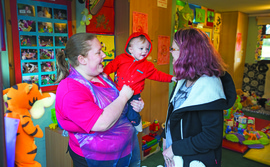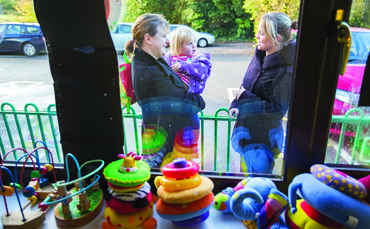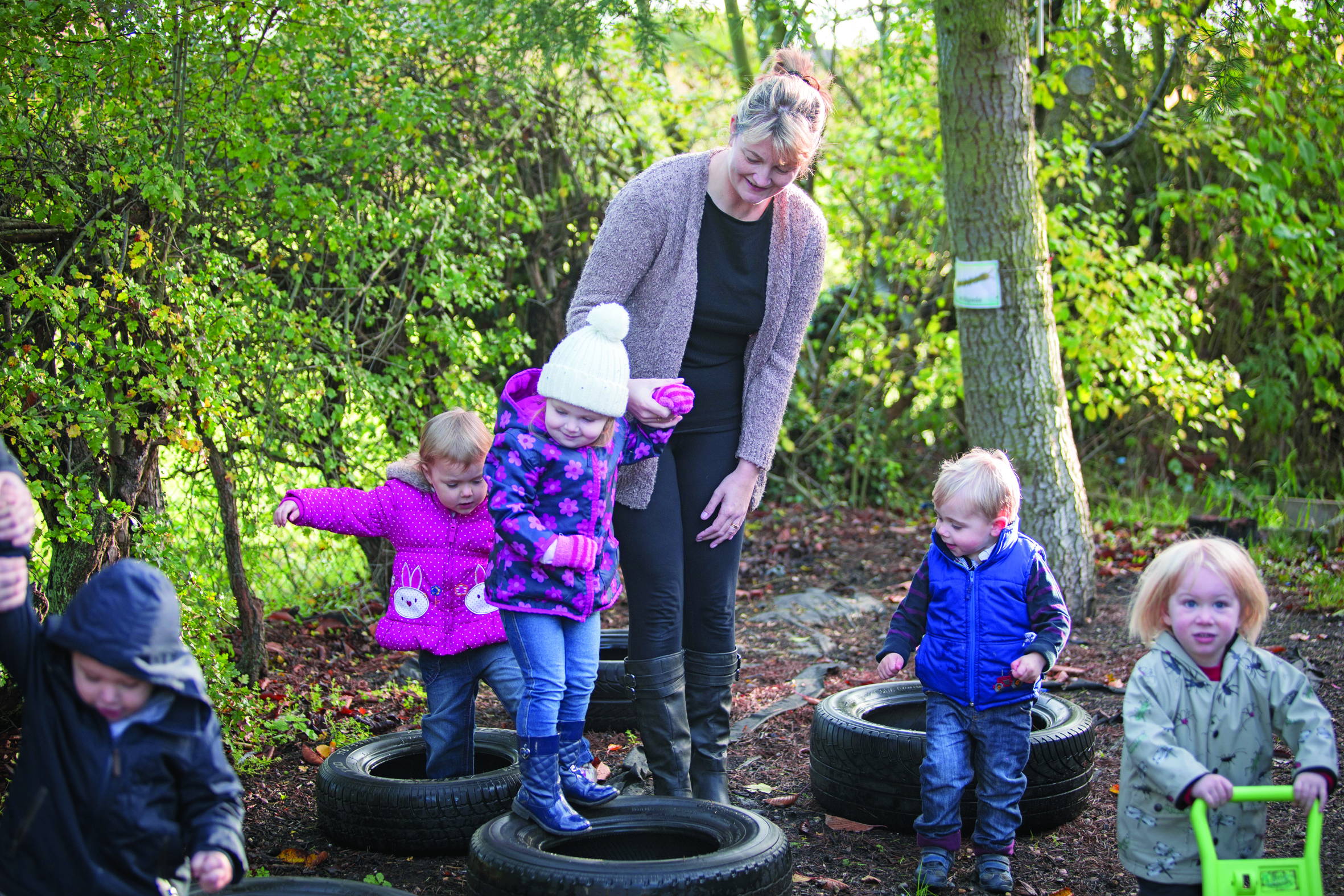
Various theories and bodies of research on child development place an increasing emphasis on how the emerging sense of self and resilience within young children are strengthened by a secure relationship with their primary caregiver.
Across the industrialised countries of the world, full daycare in a group setting is a fact of life for ever more children at ever earlier ages, for ever longer hours. Today, it is possible that young babies and children may spend more time across a week in the care of a secondary caregiver than in their own parents' care.
A baby who is in nursery from the age of three months old to school age, from 8am to 6pm, five days a week, will spend thousands of hours in out-of-home care. This, in what is a significant and crucial period of time in any child's life, leads us to realise how equally important the relationship between a parent and their child's secondary caregiver should be.
A profound act of faith is required in creating such arrangements for the care of one's children with unknown adults. How this relationship between a parent and practitioner grows in a meaningful way and in the best interests of each child requires sensitivity and reflection.
FITTING THE SPACE 
Our book, Building Positive Relationships with the Parents of Young Children, was written against the backdrop of the August riots in 2011 when a repeated question was: where are the children's and young people's most important and enduring teachers, their parents?
Amid the crisis, former chief rabbi Jonathan Sacks noted that, 'Children grow to fit the space we create for them. If it is big, they grow tall. If it is small, they rebel.' At the heart of our book, we wished to address the spaces for our parents in early years.
When practitioners speak of parental disengagement, we ask them to remain positive and gently curious about why this might be. We ask them to trust that sincere engagement with these parents makes them agents for change. Developing the ability to communicate from the heart with these parents can transform the relationship. Many parents today are isolated from their relatives and friends and neighbours due to geographical relocation and busy professional lives.
Early years settings that foster positive attachment relationships are fundamental to the health of our human condition and communities, socially, psychologically and spiritually.
If our work with our youngest children aspires to the ability to imagine their psychological states of mind, then we already have at our fingertips the skills we require to become reflective with and about our parents.
Our hope, joy and professional capability in early years work rests on creating authentic and strong attachments with our parents and developing some of the skills necessary to master the psychology of communication, which we choose to call 'communicating from the heart'.

DAILY ENCOUNTERS
The daily encounters of 'meet and greet' at the threshold of a nursery or pre-school become moments of important psychological connection and disconnection for practitioners and parents. How practitioners become an effective and secure bridge at such points of transition is worthy of examination.
Creating meaningful transitions at the beginning and end of a day lies initially in both adults involved sharing a belief that how we move from the 'there and then' (home) to the 'here and now' (the setting) and vice versa really matters.
We honour parents by showing a level of sensitivity as they say their goodbyes and welcoming them back on their return. In so doing, we are recognising 'the interdependence between family-friendly societies, competent parenting and healthy confident children' (Gordon, 2009).
We may also wish to remain curious about the parent who appears 'to drop and run' or the parent who is habitually late, for they may be communicating through their seeming avoidance of a goodbye, or their not allowing themselves to be welcomed in, how difficult the feelings of loss or reconnection may be for them to manage.
RECIPROCAL COMMUNICATION
Practitioners committed to building positive parent relationships are not simply focused on what they say but how they relate sensitively to parents and how reflective they are about what they wish to communicate.
The reciprocal communication or 'heartbeat of human existence' (Kaplan, 1995) might translate in small significant encounters at points of transition in pre-school settings. A sensitive and responsive encounter during a 'meet and greet' can alter a parent's state of being and help organise their feelings before they go into the world without their most precious gift, their unique child.
It is clear that the role of the key person is to establish and maintain an equality of relationship between the child, parent and practitioner as in the 'Triangle of Trust' developed by Goldschmied (1994). These close relationships with the families, sometimes over many years, play a key part in establishing trust, restoring hope when there are 'ups and downs' and maintaining empathy. We cannot teach empathy, for it involves feeling and is something shared.
SECURE ATTACHMENTS
It is one of the great joys in the professional work of early years to build strong positive relationships with the parents of children in one's care. When a triangle of secure attachments is created, we are laying the foundations of learning and good mental health for each child.
Research has shown that children thrive, not only when they have made secure attachments with their key caregivers, but also when parents and practitioners have good working relationships and can trust and care about each other.
It is now widely recognised that Bowlby's theory of attachment is not just about the early bonds between an infant and primary caregiver. Making secure attachments is a lifelong process and the early years practitioner is a key facilitating figure for young families whose children attend nursery provision of one kind or another.
In the past decade, with the rapid developments in technology, great advances have been made in the understanding of infant and early childhood development. It is now recognised that babies' brains actually need affection and that the early interactions between parents, carers and babies have lasting effects, both positive and negative. A wonderful and thoroughly researched book on this subject is written by Sue Gerhardt and entitled Why Love Matters (2004).
It is of vital importance, therefore, that early years practitioners recognise, celebrate and take responsibility for the extremely significant part they play in the development of young children and their families.
FROM THE HEART

Dictionary definitions for the word 'communication' often describe it as conveying information or a message. However, if you think that being a good conveyer of messages is simply being a good communicator, you will never build strong positive relationships with anyone.
True communication comes from the heart and is about tuning in to another, effectively showing and genuinely feeling that you care. You can even care about someone you don't really like if you are able to see the other person as a fellow human being with feelings just like you.
BARRIERS
A lack of awareness that each encounter with a parent is an opportunity to be an agent for change may become a barrier to a relationship flourishing and developing.
An inability to be mindful of others and realise that we need to take time to evolve an understanding of why we think and feel the way we do in relation to others may be an additional obstacle to a positive relationship.
Essentially, we communicate emotional energy wherever we go and other people will pick it up. We talk about how we can feel the 'atmosphere' of a place; does it feel 'cold', 'welcoming', 'friendly' or 'threatening'? How would a new parent describe the atmosphere of your setting as they walked in?
When we meet someone, we can probably tell if they are relaxed or stressed (unless they mask it well). Have you noticed how when you are having a bad day, the children in your care detect it and become more demanding? They are picking up on your emotional energy.
There is also the current climate to consider. Fears about child health and safety have made many of us risk averse, while recent safeguarding tragedies have sometimes engendered suspicion and anxiety. Such responses can lead to us inadvertently distancing ourselves from both our parents and their children, and sometimes even disregarding our intuitive, nurturing selves.
This 'atmosphere' is generated by one of two energies - that of love or fear. While life is a blend of both these energies, if we become focused on the energies of fear at the expense of the energies of love, then life becomes sad, difficult and painful (see table).

Parents who feel insecure and uncertain about leaving their children or about their own parenting skills will be communicating the energies of fear.
The energy of love is most visible when we feel self confident and have enough self awareness to be able to acknowledge our own foibles and personality style and yet be able to reach out to others with empathy, consideration and kindness. This is the foundation of all good communication skills, which we need to build positive relationships with others.
CONTEXT FOR REFLECTION
The statutory requirement in the revised Early Years Foundation Stage (EYFS) of supervision for all early years staff should provide a context for reflective conversations about our relationships with parents (Statutory Framework for the EYFS, para 3.19).
As Hawkins and Shohet say, 'Supervision can be a very important part of taking care of one's self, staying open to new learning, and an indispensable part of the helper's well-being, on-going self-development, self-awareness and commitment to development. We think that lack of supervision can contribute to feelings of staleness, rigidity and defensiveness' (2006).
CASE STUDY: SALLY'S STORY
Sally owns and runs her own nursery and pre-school in a large rural village. The nursery has a family feel about it and most of the children come from the village. Currently, one of the children, Jessica, is biting other children and Sally had discussed with staff the strategies they could use to help Jessica. What she has not realised is that she did not explain clearly enough to her staff about 'how' to talk to Jessica's mother about this.
One day, Sally overhears an inexperienced member of staff talking to Jessica's mother, when she comes to pick up her daughter. The staff member is clearly tired because it had been a difficult day with Jessica. However, Jessica's mother is also tired at the end of her working day. Sally is horrified because the first thing the mother is greeted with was, 'Oh, today has been a hard day for us. Jessica has been biting other children a lot.'
After this event, Sally speaks to her staff and explains that however difficult a day they might have had with any of the children (whatever the issue), it is inappropriate to bombard a parent with negative comments the minute they walk through the door. She invites her staff to think about a better way to greet parents after a difficult session. This is what they came up with and can be a template for dealing with any type of behavioural problem:
- Make a positive comment first - 'We've had a lovely day; Jessica had some fun in the role play area.'
- Explain the problem - 'Although Jessica has been lovely most of the time, there has been some challenging behaviour.' (More details can be given when the mother has had a chance to take this in.)
- Ask the parent for help - 'We'd like your advice about how you deal with this at home.'
SEVEN PATTERNS OF GOOD PRACTICE
Our disposition and capacity to be highly sensitive to our parents' situation can be helped by the Seven Patterns of Good Practice below. These patterns, which are simple but very powerful and if consciously practised over a two-month period, will positively transform your professional relationships with parents.
Smile If someone smiles at you, have you noticed how you feel an immediate positive connection with that person? We think we smile far more than we actually do, so make a conscious effort to smile at parents when you see or talk with them, as it will immediately help you both feel more relaxed.
Meet and greet Make sure that you give at least a few uninterrupted seconds of your time to greeting parents (by name) when they arrive with their child; this facilitates a good transition for both the parent and child.
Be unrushed in your manner When you are talking with parents, it is important to give them the feeling that they are the most important person in the world, by expressing interest in them in an unrushed manner.
Show that you care You need to remind yourself every day that, to a parent, the child you are working with is the most precious part of their lives. Demonstrate to a parent that you care about their child in the way that comes most naturally to you.
Show enthusiasm There is nothing like a bit of enthusiasm to inject positive energy into a relationship. However tired you might get, allow the fundamental enthusiasm you feel for your work to shine through.
Be positive While it is important to share concerns with parents, make sure that every day the first thing you tell a parent when they come to fetch their child is something positive, however small.
Actively listen Underpinning the other six patterns of good practice is the ability to listen actively. This means listening so that you are fully attentive. It is particularly important to listen when a parent is expressing concern. Often a problem can be solved, not by doing anything different but by listening and taking the other person seriously.
Veronica Read is group analyst and educational consultant at Kairos Consultation and Anita M Hughes is a chartered educational psychologist
CASE STUDY: LITTLE TREASURES DAY NURSERY
What are the rules for building positive relationships with parents? Ruth Thomson spoke to nursery manager Tracy Stephenson to find out
Little Treasures Day Nursery, in Penkridge, has just been awarded its third consecutive outstanding report from Ofsted, with a particular strength being its 'superb' working relations with parents.
'We pride ourselves on our positive partnerships with parents and this is one thing that was really highlighted in our most recent Ofsted report,' says Tracy Stephenson, manager of the 71-place nursery, set in rural Staffordshire.
Since opening in 2002, the nursery has received only outstanding awards, and it is the only Staffordshire day nursery to have achieved this.
Its latest Ofsted report notes, 'Parents comment that they have excellent relationships with all staff and are extremely confident in their professionalism and ability to care for and nurture their children. They feel reassured that all staff know each child remarkably well, enhancing their sense of trust and security in the quality of their child's care.'
- So, what does the setting see as the essentials of building positive relationships with children?
Be welcoming
Based in a house, parents enter to see photographs of the staff team, children at play and families on parents' days, as well as information about recent events, such as fundraising occasions.
Be professional
'You have to be professional to have good relations with parents,' says Ms Stephenson. 'It is important that parents build up a trust in the staff as quickly as possible. Staff are fully aware of the respect that they are to show parents, listening to their ideas and opinions, and offering advice in order to cater for their child's needs as a partnership.'
Be open and honest
'At the first meeting with parents, we go into a lot of detail about what we do and we're very honest about our expectations and what makes for a good relationship.
'We have an open-door policy and we tell parents not to be afraid, to come in, to get involved, to stay and play.'
Build trust from the start
'At the initial meeting, there is time for parents to discuss their child's routine, likes and dislikes, and to ask questions.
'We then encourage them to leave their children with us for one hour, then two, three and four hours before their start date and we make time for the staff to get to know the child and the family and vice versa.'
Be supportive and consistent
'Staff continually support parents in managing their children's behaviour, routines and learning.
'We have 25 staff, most of whom have been with us for many years. New members of staff don't deal with parents straight away. At the start, they stand back and watch and are introduced gradually to working with parents to make sure we are all taking the same approach and feel confident in dealing with families.
'We also mentor our staff, so if we see something that could have been handled better, we'll talk to them about it.'
Be positive
'When talking to parents at the end of the day, practitioners will always talk about something that the child has really enjoyed.
'If there is a particular issue to deal with, such as biting, we always sandwich any negative comment between two positives, so that the parent never walks out of the door on a negative point.'
Be sensitive
Staff are sensitive to any family concerns about their child's behaviour or development. However, 'difficult conversations' have been made easier thanks to the Progress Check at Age Two, says Ms Stephenson - 'It presents the perfect opportunity to raise concerns. Parents know about it, it isn't something that comes out of the blue and they seem able to deal with it better.'
Celebrate children
Staff provide regular opportunities for parents to discuss their children's needs and celebrate their progress. For example, parents share observations of their child's achievements at home through 'proud clouds', which are displayed and celebrated within the setting.
Build loving relationships
'We're very loving and we give the children hugs and kisses and parents can tell that the children love the staff, as they come in with arms open to them. They may not always take to all the staff, but there's always some that they'll bond with. Like us, children are drawn to different people.'
Take time to keep parents informed
'Parents are given liaisons sheets and feedback about their child at the start and end of each day, and there's a phone in each room so parents can call at any time to speak directly to the staff and they do that a lot.'
'We also hold sessions where parents are invited to come along and discuss their child's developmental progress and look through their profile of observations, though we also encourage parents to look at these at any time.'
'We have time for parents and, if we can, have a good chat with them when they drop off or pick up their child. The key worker deals with the child's development, but any member of staff can talk to parents at the end of the day, so all staff know all the parents really well, and when someone is on holiday the parents aren't left feeling lost.'
Keep parents involved
'The main barrier for some parents is time, as they rush in and rush off again. So, we have a Facebook page where we post daily updates about what we are up to and send out regular newsletters detailing upcoming events, activities and general information.
'We hold special days such as coffee mornings, parents and grandparents lunches, story times, singing sessions, outdoor play activities and fundraising events.
The Ofsted report notes, 'Parents feel that (these events) contribute overwhelmingly to developing stronger relationships between themselves and the setting.'
The nursery also asks for feedback from parents. 'We send out parent questionnaires three months after a family joins us and each time a child moves to a new room to find out how they are feeling and if there is anything that they feel could improve our services.'
Having sought feedback, the Ofsted report continues, the nursery responds 'transparently to areas identified for improvement'.
MORE INFORMATION
- Building Positive Relationships with Parents of Young Children: a guide to effective communication, by Anita M Hughes and Veronica Read (2012)
- No Voice is Wholly Lost, by L Kaplan (1995)
- People Under Three: young children in daycare by E Goldschmied and S Jackson (1994)
- Roots of Empathy: changing the world child by child, by M Gordon (2009)
- Supervision in the Helping Professions, by P Hawkins and R Shohet (2006)
- Why Love Matters: how affection shapes a baby's brain, by S Gerhardt (2004), Hove, Sussex.









